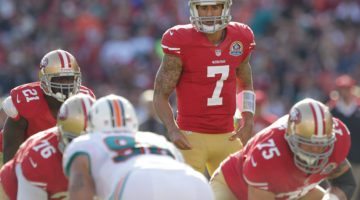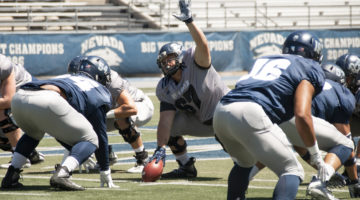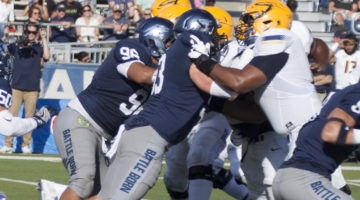
Photo courtesy of Wikipedia
Thunder guard Victor Oladipo (5) stands on the court during a game against the Kings in Amway Center in 2013 when he played for the Orlando Magic. He said he expects national anthem protests during NBA games.
Neil Patrick Healy, the sports editor for the Nevada Sagebrush, has a unique outlook on sports. Each week, he chooses a handful of topics and gives his own take. The opinions expressed in this commentary are solely those of the author and does not reflect the opinion of the Nevada Sagebrush.
By Neil Patrick Healy
The amount of protests during the national anthem in the NFL has been increasing with each passing week. More players are beginning to join 49ers quarterback Colin Kaepernick in his stance. The dialogue has been mostly about soldiers and the flag, while football, baseball and hockey coaches have voiced their displeasure with the gesture and said they wouldn’t allow it on their team. One anonymous NFL executive even went as far as calling Kaepernick a “traitor.”
As I was reading and hearing these comments from those in power, I noticed a common trend: none of them were from the NBA.
Oklahoma City Thunder guard Victor Oladipo came out and said that there’s “no question” that NBA players will follow Kap’s lead and protest during the anthem once basketball season rolls around. An important detail though is the NBA, unlike the NFL, does have a rule in place that requires players to stand during the anthem.
It wasn’t surprising to me when Oladipo said this, but the silence from basketball executives illustrated that the NBA has to handle the protests differently than other leagues because of the perception that basketball is a “black sport.”
“But Neil, nearly 69 percent of the NFL is black!” some people will say angrily as they read this. It’s true, a majority of NFL players are African American, but there are two reasons why the NFL isn’t perceived as a “black sport” like the NBA is.
1. The NFL audience is vastly white.
An Experian Simmons study found that 83 percent of people who identified themselves as NFL fans were white, while only 9.5 percent were black. In comparison, a study conducted by The Atlantic showed that only about 40 percent of NBA fans were white, while 45 percent were black. Does this mean black people don’t like the NFL? No, but it means a lot of white people like it. The NBA will undoubtedly reflect the values of its sizable African American fan base and its players, which are 74 percent black.
In between games on TNT or ABC, the commercials are always filled with black actors. The NBAtickets.com commercial depicts a black family buying tickets after seeing the Andersons got tickets. “The Andersons got tickets to the game? How’d they get tickets?!” The McDonalds commercials always have black actors and the promos for Tyler Perry shows like “House of Payne” or “Meet the Browns” are always on when games are broadcast on TNT. The Sunday games on ABC have in-game promos for a show called “Black-ish”. NFL ads consist of clips of “New Girl” or “60 Minutes,” depending on if you’re watching FOX or CBS.
Not with me yet? OK, how about All-Star games and halftime shows? Look at the some of the Super Bowl halftime performers. The NFL books acts like Bruce Springsteen, Tom Petty, The Who, Katy Perry and Coldplay. The time they got Beyoncé to perform she did a tribute to the Black Panthers and it sparked outrage within the NFL fan base.
In the NBA, rappers like Drake greet players like LeBron James, Steph Curry and Russell Westbrook after they’re introduced at the All-Star game in Toronto. Halftime of game five of the 2013 finals was when hip hop artist Jay-Z announced the release of his new album via a Samsung commercial — the same Jay-Z that was a partial owner of the Brooklyn Nets and helped push the franchise’s move to Brooklyn. The same Jay-Z that runs his own sports agency and represents perennial all-star Kevin Durant.
The All-Star game in 2014 had performers like Kendrick Lamar and Earth, Wind & Fire play at halftime. When the NBA booked Sting to perform the All-Star game last year, the entire league’s fan base was skeptical. The audiences are vastly different.
2. The NFL has major home-grown white superstars.
The key term in there is “home-grown” because the cultural differences between white Americans and white Europeans are numerous. 23 percent of NBA players are white, but a large number of them come from Europe, Australia or New Zealand. It’s hard to market German-born Dirk Nowitzki or the Spanish-born Gasol brothers to an American audience.
The marketability of white NFL players is extremely prominent. From JJ Watt being in Poppa Johns and Bose ads, Tom Brady trying to sell us a $5,000 mattress and Peyton Manning being in almost every commercial ever, the NFL doesn’t suffer from a lack of marketable white superstars. The only current white American NBA player in a commercial that I can remember is Kevin Love in a chocolate milk campaign where he’s rebounding alone in a gym while pounding down some chocolate milk.
According to Forbes, seven of the top nine NFL players who made the most money from endorsements in 2015 were white (Seahawks quarterback Russell Wilson at No. 6 and former Seahawks running back Marshawn Lynch at No. 8 were the two African American players). Forbes’ top nine NBA endorsement grossers in 2015 were all black.
Does this mean some NBA executive won’t speak negatively about protests once the season starts? Of course not. Nothing is guaranteed. But at the same time the NBA is most likely going to handle the situation differently. One can make an excellent argument that the NBA is the most progressive sports league by far, and the league’s track record on social issues illustrates that.
Commissioner Adam Silver, who had been on the job for less than three months, expelled former Clippers owner Donald Sterling from the league after his racially charged comments about black players.
The league also moved its 2017 All-Star Game from Charlotte, North Carolina, in response to the state’s controversial HB2 law, which was the first major sporting event to be moved from a state in response to one of its laws. The NBA players union had its proposal for a health care plan for its retired players ratified in August, making it the first health care plan of its kind in a major sports league.
NBA owners and executives will most likely either express their approval or just keep silent. Duke head coach Mike Krzyzewski, who coaches many star players for team USA, has already come out in support for the protesters, saying, “It’s their right.”
The narrative surrounding this anthem protest in the NBA will most likely be vastly different from the one currently engulfing the NFL. The NBA’s progressive and inclusionary track record combined with its popularity in the African-American community will almost ensure that.
Neil Patrick Healy can be reached at neil@sagebrush.unr.edu and on Twitter @NP_Healy.












